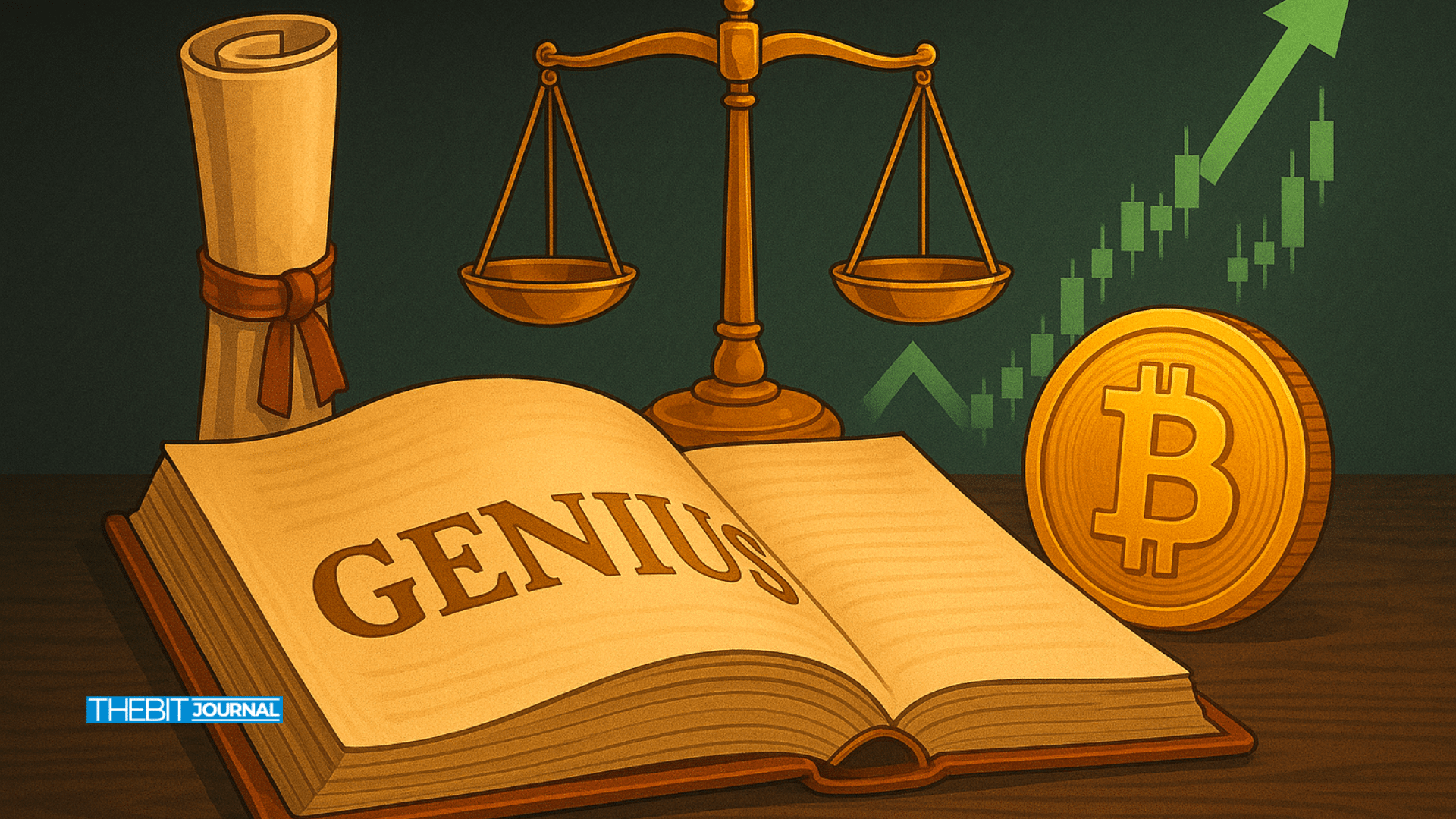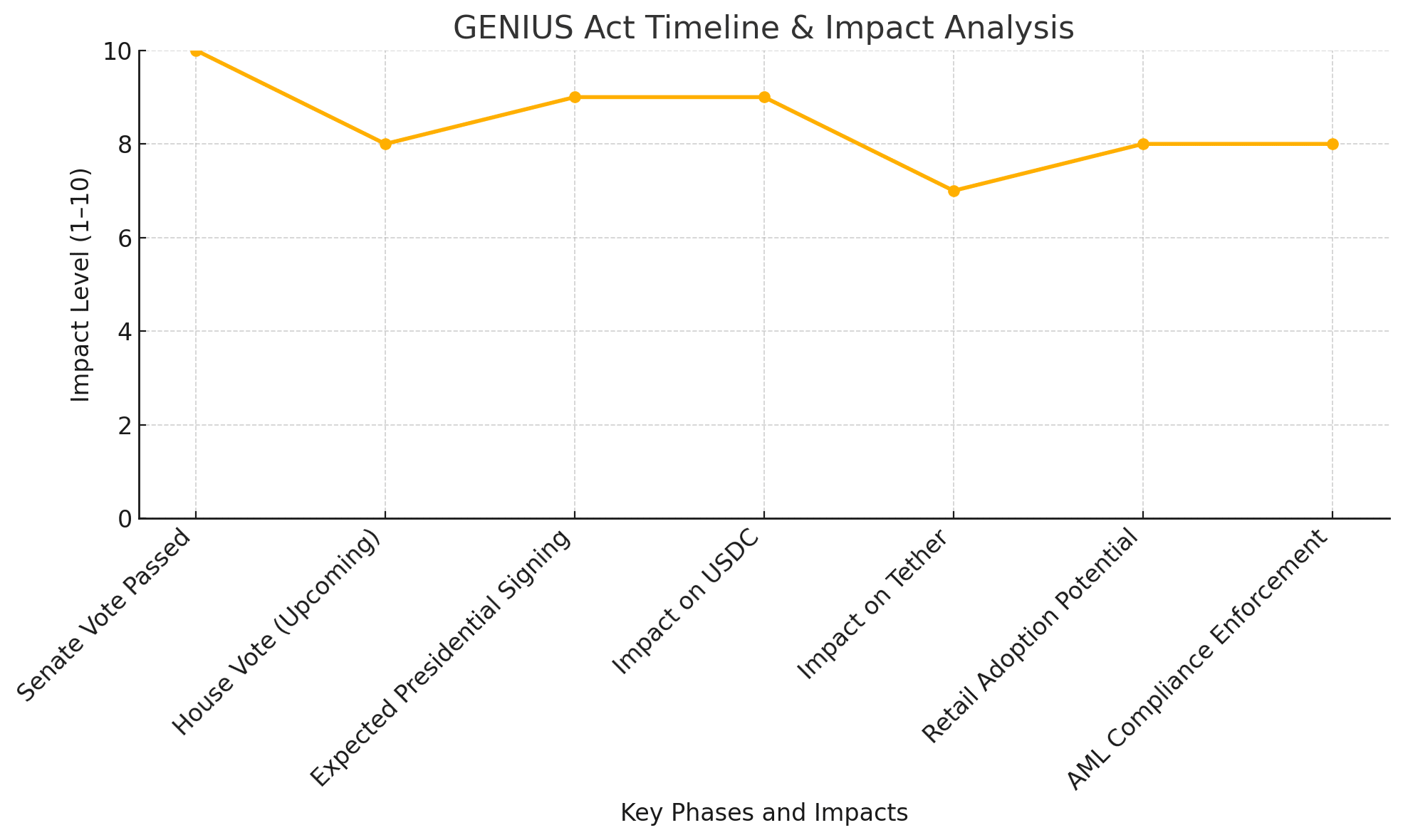GENIUS Act Passed But Here’s What They Are Not Telling You
0
0

The U.S. Senate has passed the GENIUS Act, a comprehensive bill aimed at establishing a clear legal framework for stablecoin regulation. Passed with a bipartisan majority of 68–30 on June 17, 2025, the bill is being hailed as one of the most significant crypto policy moves in American history.
The GENIUS Act, short for “Guiding and Establishing National Innovation for U.S. Stablecoins”, lays down detailed compliance guidelines for the issuance, backing, and operation of USD-pegged digital currencies. Industry experts are already calling this a watershed victory for the cryptocurrency sector.
Key Highlights of the GENIUS Act
At its core, the bill targets the heart of stablecoin regulation by introducing strict, auditable requirements for reserve backing, transparency, and compliance:
-
All stablecoins must be 100% backed by U.S. dollars or highly liquid Treasury assets.
-
Monthly disclosures and third-party audits are mandatory for issuers holding more than $50 billion in circulation.
-
Issuers must register under a new class of “Licensed Stablecoin Issuers” through the Treasury Department.
-
Lawmakers and senior federal officials are barred from issuing or holding stablecoins, aimed at reducing conflict of interest.
These measures are designed not only to boost trust in dollar-backed digital assets but also to foster a stronger, regulated U.S.-based stablecoin economy.

Industry Applause: Circle, Visa, Walmart, Amazon Approve
The GENIUS Act has drawn support from major U.S. companies, including Circle (issuer of USDC), Visa, Walmart, and Amazon. These corporations have long advocated for clearer stablecoin regulation, believing it will unlock frictionless payments and scalable blockchain finance.
Jeremy Allaire, CEO of Circle, tweeted shortly after the Senate vote:
“This is the clarity we’ve been waiting for. The U.S. is finally taking the lead in stablecoin regulation, and it opens the door for real innovation.”
Meanwhile, offshore competitors like Tether could face stricter entry barriers, given the requirement to hold reserves in U.S. institutions and abide by American financial transparency laws.
What’s Next: House Vote and Trump’s Desk
The bill now heads to the Republican-controlled House of Representatives, where it is expected to pass with slight modifications. If successful, it will land on President Donald Trump’s desk by early August—a timeline that crypto advocates hope will be met without delay.
While the GENIUS Act is currently focused on fiat-backed coins, its momentum could trigger a domino effect, pushing other frameworks like the CLARITY Act and FIT21 further up the legislative queue—two other proposals that expand stablecoin regulation to algorithmic and hybrid digital assets.

Critics Sound the Alarm
Not all lawmakers are on board. Progressive Senator Elizabeth Warren voted against the GENIUS Act, citing insufficient consumer protections and ethical loopholes.
“This bill enables financial innovation, yes, but at the cost of consumer safety,” Warren stated. “Until these coins are insured and federally backed, we’re gambling with Americans’ savings.”
Still, the broad Senate support underscores a growing bipartisan recognition of the need for federal stablecoin regulation before the private sector or global players dictate U.S. monetary technology.
Stablecoin Regulation: Why It Matters for the Future
The significance of the GENIUS Act goes beyond just regulatory clarity. Here’s what it could unlock:
| Impact Area | What It Means |
|---|---|
| DeFi and Tokenization | Compliance-ready tokens can be integrated into mainstream financial products. |
| Retail Payments | Retailers like Amazon and Walmart can use stablecoins for faster, cheaper transactions. |
| Banking Inclusion | With proper stablecoin regulation, underbanked users gain access to dollar-backed financial services. |
| Global USD Demand | Proper regulation could turn stablecoins into a powerful U.S. soft power tool abroad. |
Final Thoughts
With the GENIUS Act clearing the Senate, the U.S. is no longer lagging behind in stablecoin regulation. The clarity this bill offers could usher in a new era of digital finance, one where the dollar remains dominant, but with the speed, transparency, and programmability of blockchain technology.
FAQs on the GENIUS Act & Stablecoin Regulation
What is the GENIUS Act?
The GENIUS Act is a U.S. Senate bill that introduces formal regulations for stablecoins, focusing on transparency, reserve backing, and issuer compliance.
Why is stablecoin regulation important?
Stablecoin regulation provides legal clarity, consumer protection, and financial stability, making digital assets safer and more attractive for mainstream use.
Which stablecoins are affected by the GENIUS Act?
The act targets USD-backed stablecoins like USDC, USDT, and any coin seeking legal issuance within U.S. jurisdictions.
Will this impact Tether (USDT)?
Yes. Offshore stablecoins like Tether may face barriers unless they comply with U.S. transparency and reserve holding standards.
Glossary of Key Terms
Stablecoin
A type of cryptocurrency pegged to a stable asset like the U.S. dollar, used to reduce volatility.
GENIUS Act
A U.S. Senate bill that sets clear rules for issuing and managing stablecoins, focusing on transparency and reserve backing.
Reserve Backing
Assets (like cash or Treasury bills) held to ensure a stablecoin can be redeemed 1:1 for its value.
Licensed Stablecoin Issuer
A legal status created by the GENIUS Act for entities allowed to issue stablecoins under U.S. oversight.
AML Compliance
Anti-money laundering procedures are required for legal financial operations, including KYC and transaction monitoring.
Transparency Disclosure
Regular public reporting on financial health, reserves, or audits is required under the GENIUS Act.
CLARITY Act
A separate U.S. crypto bill aiming to define digital assets and outline security classifications.
FIT21
Framework for crypto investor protection and market integrity—another major bill under review in U.S. Congress.
Sources and References
Read More: GENIUS Act Passed But Here’s What They Are Not Telling You">GENIUS Act Passed But Here’s What They Are Not Telling You
0
0
 Manage all your crypto, NFT and DeFi from one place
Manage all your crypto, NFT and DeFi from one placeSecurely connect the portfolio you’re using to start.




